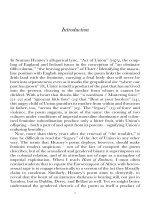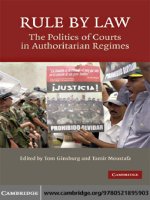0521873339 cambridge university press wounds of memory the politics of war in germany nov 2007
Bạn đang xem bản rút gọn của tài liệu. Xem và tải ngay bản đầy đủ của tài liệu tại đây (1.23 MB, 311 trang )
Wounds of Memory
German memories of the Second World War are controversial, and they
are used to justify different positions on the use of military force. In
this book, Maja Zehfuss studies the articulation of memories in novels in order to discuss and challenge arguments deployed in political
and public debate. She explores memories that have generated considerable controversy, such as the flight and expulsion of Germans from
the East, the bombing of German cities and the ‘liberation’ of Germany
in 1945. She shows how memory retrospectively produces a past while
claiming merely to invoke it, drawing attention to the complexities and
contradictions within how truth, ethics, emotion, subjectivity and time
are conceptualised. Zehfuss argues that the tensions and uncertainties
revealed raise political questions that must be confronted, beyond the
safety net of knowledge. This is a compelling book which pursues an
original approach in exploring the politics of invocations of memory.
m a ja z e h f u s s is Professor of International Politics at the University of
Manchester. She is the author of Constructivism in International Relations:
The Politics of Reality (Cambridge, 2002) and has written articles for
a number of journals, including the European Journal of International
Relations, Millennium, the Review of International Studies, Third World
Quarterly, International Relations and International Politics.
Wounds of Memory: The
Politics of War in Germany
Maja Zehfuss
CAMBRIDGE UNIVERSITY PRESS
Cambridge, New York, Melbourne, Madrid, Cape Town, Singapore, São Paulo
Cambridge University Press
The Edinburgh Building, Cambridge CB2 8RU, UK
Published in the United States of America by Cambridge University Press, New York
www.cambridge.org
Information on this title: www.cambridge.org/9780521873338
© Maja Zehfuss 2007
This publication is in copyright. Subject to statutory exception and to the
provision of relevant collective licensing agreements, no reproduction of any part
may take place without the written permission of Cambridge University Press.
First published in print format 2007
ISBN-13
978-0-511-46331-0
eBook (EBL)
ISBN-13
978-0-521-87333-8
hardback
Cambridge University Press has no responsibility for the persistence or accuracy
of urls for external or third-party internet websites referred to in this publication,
and does not guarantee that any content on such websites is, or will remain,
accurate or appropriate.
In Erinnerung an Gerhard Zehfuß (1942–2004)
Contents
Abbreviations
Preface
1 Speaking of war and memory
Speaking of war and memory: political debate
Speaking of war: novels
Reading memory
Speaking of the Second World War (and not the Holocaust)
2 Forgetting to remember?
The significance of remembering
The significance of forgetting
How to remember (and forget)
Memories of the flight and expulsion from the East: Grass’s
Im Krebsgang
Multiple memories
The imperative to remember and the desire to forget
Forgetting to remember
The reframed war revisited
Concluding thoughts
3 Wounds of memory
Don’t mention the war?
The year of remembrance 1995: time to mourn?
Air war and literature: the (im)possibility of truth in fiction
Der Brand: inappropriate sentimentality?
The problem of victimhood
Ledig: Vergeltung
Mulisch: Das steinerne Brautbett
Victims and perpetrators in one
Memories of strategic bombing and the Iraq war
Concluding thoughts
4 The truth of memory
Never again German war
Forgotten Wehrmacht atrocities: the exhibition
Recreating immediacy: Ledig’s Die Stalinorgel
Impossible authenticity: Walser’s Ein springender Brunnen
page ix
xi
1
4
13
20
26
32
33
37
40
41
55
60
63
68
71
76
77
79
81
87
92
96
101
108
116
121
126
127
129
141
146
vii
viii
Contents
Representing war and the political context
The truth of fiction
Beyond truth? Emotion and ethics
Representing war: the other political context
Concluding thoughts
5 Times of memory
Memory and temporality: between past and present?
When we remember: Johnson’s Jahrestage
Different times: Vonnegut’s Slaughterhouse 5
Tensions of time
Thinking time differently
The future of ethics
Concluding thoughts
6 Memory, uncertainty, responsibility
Challenges of memory
The spectre of horror
The spectre of the Holocaust
War and the spectre of its Other
Speaking of war and memory: uncertainty and responsibility
Bibliography
Index
151
155
161
166
171
175
176
182
189
197
208
213
218
221
221
228
242
251
259
267
285
Abbreviations
BBC
CDU
CSU
EDC
FDP
FRG
GDR
NATO
PDS
POW
RAF
SA
SD
SPD
SS
UK
UN
UNPROFOR
USA
British Broadcasting Corporation
Christlich Demokratische Union (Christian Democratic Union)
Christlich-Soziale Union (Christian-Social Union)
European Defence Community
Freie Demokratische Partei (Free Democratic Party)
Federal Republic of Germany
German Democratic Republic
North Atlantic Treaty Organisation
Partei des Demokratischen Sozialismus (Party of
Democratic Socialism)
Prisoner of War
Royal Air Force
Sturmabteilung
Sicherheitsdienst
Sozialdemokratische Partei Deutschlands (Social
Democratic Party of Germany)
Schutzstaffel
United Kingdom of Great Britain and Northern
Ireland
United Nations
United Nations Protection Force in the former
Yugoslavia
United States of America
ix
Preface
When I grew up, war was bad. Unconditionally bad. What was particularly bad was Germans being involved in any war. ‘We’ had started two
world wars, after all. Although Germans are still seen as profoundly biased
against war, war has been able to dramatically improve its reputation.
Germans still hesitate to call it that when they are involved – Kampfeinsatz (combat mission) being the most martial terminology thinkable – but
war, in some guises, has become acceptable. And I am still struggling to
understand. What is perhaps most astonishing is that the Second World
War – the very reason war was so assuredly bad – came to be instrumentalised in justifying this shift, in justifying the permissibility of war.
One of the intriguing aspects about the debates I explored for my previous book,1 in which I trace this shift, was that from the Gulf War onwards
the Second World War and memories of it were invoked in order not only
to make sense of the problem of using force today but to argue for it.
In other words, the bad war was used to argue that war wasn’t so bad
after all. At the same time, it was used, of course, to warn against war.
This is intriguing, especially since – even though the Second World War
was mentioned time and again – not very much was said at all about
that war and Germans’ experiences in it. Although politicians, intellectuals, scholars and ‘ordinary’ Germans often seem strangely certain about
what ‘Germans’ remember, I found myself wondering about what the
Germans know or remember of the war – and about whether that is
the right question to ask. As it happened, once I had started on the
project, these questions were drowned out by a flurry of interest in
the war amongst the German public: interest in Allied bombing against
German cities, the flight and expulsion of Germans from the East, the
rape of thousands of women at the end of the war and Stalingrad.
Suddenly, the Second World War was ‘in’, and this led to heated debate,
not least about how Germans may today relate to those events: does
1
Maja Zehfuss, Constructivism in International Relations: The Politics of Reality (Cambridge:
Cambridge University Press 2002).
xi
xii
Preface
remembering suffering amount to construing Germans as victims of the
Second World War, to playing into the hands of the far Right? In its
almost ritualistic insistence on this concern, the debate seemed similar
to the invocations of Second World War memories in order to support or
reject the use of military force. The two, in my view, are related, and both
are stuck in an unproductive pattern. Reading them together also demonstrates that the focus on an appropriate relation to the past may translate
into an unintended, and to some unwanted, programme in relation to
war today.
I am of course a member of ‘Generation Golf’, the generation that, as
Florian Illies observed, could not be moved by successive debates on the
Third Reich because we had already seen the film material disturbing the
nation in our history classes at school when we were barely teenagers,
the generation that always takes into account the ‘dark side’ of history
which was on the syllabus in pretty much every grade. Illies seems to
think that this generation has a relation to this history which is relaxed
and emotionless, which makes nervous those who still had to fight against
the silence surrounding the Third Reich, and who presume this to be a
sign of forgetting the past, of ignorance and worse.2 Although I recognise Illies’s humorous description of the Germany of my youth, I do not
share his conviction that we are ‘cool’ about our history. Yet he captures
something significant. I was astonished when I first read the argument
that recent German interest in civilian suffering in the Second World
War meant that Germans were construing themselves as victims ‘again’.
Having grown up with what Illies describes, I really did not understand
the ‘again’. Although I now know what is meant, I remain surprised that
this alleged return to the 1950s is so unproblematically assumed, denying
the experience of those who were not around at the time, and that the
‘generation of the grandchildren’ is often represented as ignorant and in
need of education in these debates. The grandchildren, of course, are
hardly children any more and, following Illies, probably know quite a bit
about this past.
Yet we don’t remember. Or do we? Politicians today, over sixty years
after the war, still invoke the Germans’ memory, the horrors they have
experienced. Do I, born several decades after the war, remember? I am
bemused that politicians should claim my memory of a time before my
birth, but I am just as astonished when I am told that I do not remember or
am admonished, invariably by someone really well-meaning who happens
not to be German, that I should no longer worry about it. Accordingly,
this subject raises for me the question of memory. What does it mean
2
Florian Illies, Generation Golf: Eine Inspektion (Berlin: Argon 2000), pp. 174f.
Preface
xiii
to remember, and what does remembering tell us about how we understand the reality we live in? Memory retrospectively produces a past while
claiming merely to invoke it, drawing attention to numerous complications regarding how we conceptualise truth, ethics, emotion, subjectivity
and time. So whilst my argument is motivated by a concern over the ways
in which memories of the Second World War have been discussed and
instrumentalised, in particular – and not unrelatedly – in ways that make
difficult a serious engagement with the Germans’ suffering in war and
that justify war today, its core is the profound uncertainty that marks our
world and the significance of acknowledging this, particularly in scholarship. Although this book is an intervention in debates about Germans’
memories of the Second World War, these debates will continue anyway.
If there is a small contribution that I would wish to make it is to destabilise
the certainty with which much is claimed – not least about what Germans
do and should remember – which is always at risk of translating into a
dangerous self-righteousness. Because ‘we’ Germans got it so dreadfully
wrong in the past, because we remember, we have privileged knowledge
about how we should act in the present. It is the burden of my argument
that knowledge, whether or not it is possible, is actually not the point.
The shock at discovering that ‘Germany’s conscience’,3 Gunter
¨
Grass,
had served in the Waffen-SS as a 17-year-old and had neglected to inform
the people he had been cajoling into admitting the crimes of the Third
Reich of the fact underlines the desire that we should be able to clearly
distinguish Good from Bad. Grass was meant to be Good. Personally, I
am cheered to know that it is more complicated. Life has a way of being so,
and we need to find the courage to acknowledge, certainly when it comes
to memory and to war, that we cannot opt simply for the Good, because it
is not on offer. Thinking that we can is nothing but a dangerous illusion.
This is not because those of us who are German ought to be anguished
about being German. During the 2006 World Cup I actually found myself
cycling across Munich with a German flag attached to my backpack. The
flag had been given to me by Linus, who had made it himself, reflecting
his enthusiasm for the tournament and, of course, Germany’s successes.
Linus’s mother, my friend Susi, had recognised my unease at the gift
and my surprise at their house being decorated with flags; but was she
meant to explain the Holocaust to her 6-year-old son? Cycling off with my
flag, I felt self-conscious at first, but quickly realised that anyone seeing
me would have assumed nothing more than that I was supporting my
country’s football team: a perfectly normal thing to do. No one would
have derived any view as to my political positions from seeing me with the
3
Tim Adams, ‘Germany’s conscience’, Observer, 10/02/02, 25.
xiv
Preface
flag. Politics and our responsibility within it involves agonising, whatever
our histories. But maybe, just occasionally, it might also help not to take
ourselves too seriously.
It should perhaps be noted that I no longer live in Germany, although
I do not feel any less German for that. My questions about the politics of
war in Germany certainly predate my move to the UK, but some issues
were brought to my attention in a different way. Some of my thoughts on
strategic bombing, for example, were prompted by a Masters seminar at
the University of Wales, Aberystwyth, and one may certainly speculate
about how far being exposed to the British way of remembering the same
war, which happens to be no less idiosyncratic, has affected my thoughts
on the matter. More importantly, however, as a German resident in the
UK, I am neither fully inside the issues raised here nor outside, and at
the same time, of course, simultaneously both. I am both at a distance
and very much caught up in what is after all part of how I construe who I
am. This has not made writing this any easier, but it may just have made
it possible.
I still cannot believe that I have written this book. My profound thanks
go to the many people who discussed with me the issues raised here
and who encouraged me to carry on when I despaired at the impossible task. Above all, I would like to thank Jenny Edkins, whose contribution is impossible to acknowledge adequately: her friendship and intellectual generosity were crucial in writing this book; Susanna Rieder, whose
enthusiasm and detailed comments persuaded me to carry on; Steve
Smith, whose advice at crucial junctures of this project was indispensable;
and Hidemi Suganami, whose favourable, if critical, comments on the
first paper towards this book made me persist in what appeared to be
a daunting project. I am also grateful to Jay Winter and an anonymous
referee for Cambridge University Press for their critical but constructive
comments on the manuscript, and to Duncan Bell and Stuart Elden for
commenting on a particular chapter. I owe a debt of gratitude to Ingo
Leiß and Helmut Schmitz, who both generously shared their expertise
in German literature, and to Roland Bleiker, Stef Craps and Eduardo
Mendieta who drew my attention to specific texts. Work towards this book
was presented in a number of settings: at the invitation of the Aberystwyth
PostInternational Group and the Cambridge International Studies Association, at several ISA conventions, at the Cambridge Centre of International Studies and at the ‘Future of Memory’ conference in Manchester.
I received fruitful feedback each time. My thanks for their productive
comments go in particular to Tarak Barkawi, David Campbell, James
Der Derian, Aida Hozic, Naeem Inayatullah, Debbie Lisle, David Smith
and Annick Wibben. I would particularly like to thank Josef Ansorge
Preface
xv
for his searching questions and for sharing his thoughtful reflections on
Germany’s past. For stimulating discussions about Derrida’s work my
thanks go especially to Dan Bulley and Nick Vaughan-Williams. As
always, I am grateful to Horst Zehfuß for keeping me in touch with the
German press, but this time also for sharing his memories.
I would like to thank the University of Warwick for two terms’ study
leave in 2003–04 which enabled me to start this project. I am also grateful
to Jackie and Graeme Smith and to V´eronique Pin-Fat for their hospitality, which enabled me to finish it.
Bernhard A. Eble of the Gedenkst¨atte Weiße Rose at the LudwigMaximilians Universit¨at Munchen
¨
kindly assisted me in discovering the
context of the plaque ‘Wunden der Erinnerung’ on the university’s main
building. The plaque, which inspired the title of this book and is briefly
discussed in Chapter 3, is part of a European project by artists Beate
Passow and Andreas von Weizs¨acker. For a description of the project see
www.dhm.de/ausstellungen/Wunden der Erinnerung.html.
Parts of Chapter 2 have appeared as ‘Remembering to Forget/
Forgetting to Remember’ in Duncan S. A. Bell (ed.), Memory, Trauma
and World Politics: Reflections on the Relationship between Past and Present
(Basingstoke: Palgrave Macmillan 2006); this material is reproduced
with permission of Palgrave Macmillan. Other material appearing in this
book, in particular in Chapter 4, has been published as ‘Writing War,
against Good Conscience’, Millennium: Journal of International Studies
33, 1 (2004), 91–121. I gratefully acknowledge permission to use this
material here.
Although my wonder at how we speak about and remember war was
significant, this book also has another origin. My thanks are to the participants of a memorable conversation on family histories in Larry George’s
kitchen, Costas Constantinou, Erin Manning and, especially, James Der
Derian, who pressed me to write about my own. Although I have not
done that in any direct way, his insistence set me off on what proved to
be a treacherous but fascinating path.
I would not write without the support of Edith, Horst and Ulrich
Zehfuß, who are there for me always: thank you. Finally, I also owe a
debt of gratitude to Gerhard Zehfuß who, in his inimitable way, was and
remains an inspiration to me: this book is dedicated to his memory.
1
Speaking of war and memory
Never again do we want to send our sons to the barracks. And if again
somewhere this insanity of war should break out, and if fate should
want it that our land becomes a battlefield, then we shall simply perish
and at least take with us the knowledge that we neither encouraged nor
Carlo Schmid (1946)1
committed the crime.
When, several decades after Carlo Schmid’s impassioned plea, the Germans2 were confronted with the question of war, they seemed to follow
his lead. They seemed to want nothing to do with war. Many objected
strongly to the 1991 Gulf War; thousands took to the streets. Most prominently, Foreign Minister Hans-Dietrich Genscher asserted that war could
not under any circumstances be a means of politics,3 a view that was
shared by opposition politicians.4 This forceful rejection of war in general and the Gulf War in particular was often illustrated, underlined and
justified with references to and memories of the Second World War. In his
statement on the Gulf War Chancellor Helmut Kohl mentioned, first of
all, the Germans’ experiences of war, their memories and their resulting
ability to understand the suffering of people caught up in war.5 These
experiences, Kohl asserted, ‘have been deeply ingrained in the memory
of our people as a whole’.6 Later, when the Federal Republic of Germany
1
2
3
4
5
6
Carlo Schmid, Erinnerungen (Bern 1979), p. 490, quoted in Donald Abenheim, Reforging the Iron Cross: The Search for Tradition in the West German Armed Forces (Princeton:
Princeton University Press 1988), p. 43. Carlo Schmid was one of the ‘fathers’ of the
Basic Law (the constitution of the Federal Republic of Germany).
The notions of ‘the Germans’, ‘German’ and ‘Germany’ are used with some (self-)irony
in this book. Evidently, none of these are homogeneous, circumscribable entities; it is
superfluous to repeatedly draw attention to this by putting them in quotes.
‘Die Deutschen an die Front’, Der Spiegel, 04/02/91, 19.
Heidemarie Wieczorek-Zeul (SPD) in Deutscher Bundestag, Plenarprotokoll, 12/2, Bonn,
14/01/91, 41; Willi Hoss (Bundnis/Die
¨
Grunen)
¨
in Deutscher Bundestag, Plenarprotokoll,
11/235, Bonn, 15/11/90, 18849.
Deutscher Bundestag, Plenarprotokoll, 12/3, Bonn, 17/01/91, 46.
Ibid. All translations from the German are mine unless otherwise noted. (Translations
below from German novels are likewise mine, and not from the standard published
translations.)
1
2
Wounds of Memory
(FRG) had to decide whether the country would itself use military force,
the Second World War became a common point of reference in the debate.
Memories of the Second World War were asserted with confidence and
represented as relevant to choices about the use of force today.
This book explores ways of speaking about war and memory in order
to tease out how, on the one hand, they produce a particular reality within
which political choices must be made, and how, on the other hand, they
simultaneously provide the opportunity to question and undermine this
reality and its production. Although memories of and other references to
the past are usually called upon with conviction, and in order to underline
the certainty of what is claimed, recourse to memory involves uncertainty.
Expressing memories of the Second World War in Germany is fraught
with difficulties; they are always contested, problematic, ambiguous. It
is puzzling, therefore, that this past was alluded to as shared and apparently uncontroversial. In other words, there is an intriguing discrepancy
between the confidence with which the past is spoken about in debates
concerning the use of the military instrument and the profound uncertainty as to what is (to be) remembered that becomes apparent when
particular articulations of Second World War memories and wider public
debates surrounding them are examined.
How to remember the Second World War is frequently a topic of controversy in Germany, for example around occasions of official commemoration, around cultural representations and around historians’ claims.
This book explores some of these debates and demonstrates that the
invocations of memory by politicians to support their positions on Bundeswehr deployments rest on shaky grounds, inasmuch as what they assert
as obvious is actually questionable. Although this is important, it is not a
new insight. That German politicians keep referring to Second World War
memories even though their controversiality is obvious raises the question
as to what such references accomplish. The superficial answer is that the
angst over its militaristic past allowed the FRG to free-ride on other countries’ provision of military security.7 This explanation, however, ignores
the fact that the past also figures prominently in arguments that support
a more assertive military role for the FRG. There is therefore a case for
looking beyond the alleged instrumentality of particular versions of memory. In claiming any memory, and indeed in making other references to
the past, a host of unspoken assumptions are made, and this has political implications. This is here examined by reading claims to memory in
7
Thomas U. Berger discusses and dismisses this argument: Cultures of Antimilitarism:
National Security in Germany and Japan (Baltimore: The Johns Hopkins University Press
1998), pp. 2f.
Speaking of war and memory
3
public debate together with a particular ‘site of memory’:8 representations
of the Second World War in novels. This site of memory is attractive in
this context for at least three reasons: firstly, novels articulate Second
World War memories which might challenge – or be used to challenge –
accepted versions of memory. Secondly, unlike politicians’ claims, novels reflect upon what it means to articulate memories in the first place.
Thirdly, although novels depict the past and sometimes are indeed offered
as testimony, they do not claim to represent an existing reality; rather,
they are thought to invent the world they depict. Thus attention is drawn
to how articulating memories – the very act of invoking the past as if it
already existed – produces a reality.
It is noticeable that memory – certainly in the German debates at issue
here – comes to be invoked when intractable questions are confronted.
This is another way in which the recourse to memory involves uncertainty. Whether it was ‘responsible’ for Germans to continue to refuse
using military power or whether, on the contrary, they were to deploy
their military to help people in distress was, despite the conviction with
which either answer was often claimed to be obviously right, a thorny
issue. This was accentuated by what was at stake: not only the lives of
German soldiers and non-German civilians but also, or so politicians
and intellectuals claimed, a potential ‘militarisation’ of German policy,
with all the consequences that might have. The past is invoked precisely
when we do not know what to do. Yet, crucially, memory cannot deliver
the certainty that is desired. It does not offer clear ‘lessons’ that may
be applied simply. The point is not, however, that we must ‘get away’
from the past and look for alternative modes of addressing the situation;
rather, questions of politics and ethics are characterised precisely by the
failure of knowledge to deliver a resolution. Thus, in this particular case,
even if Germans could determine the ‘right’ way to remember the past,
this would not tell them what to do. Similarly, even if we could determine what Germans think they know about their past, this would not
mean that we would understand their political choices. In other words,
the reflections on memory in this book do not offer ‘knowledge’ as a
solution to political problems. Indeed, the argument here is not about
expanding areas of certainty; rather, it shows just how uncertain what we
think we know is. This has implications for the present book as a piece of
academic work. Inasmuch as the book does produce something we call
‘knowledge’, it is important to be clear about the inevitable gap between
that and the political problems at issue, for knowledge is never sufficient
8
The term is Jay Winter’s: Sites of Memory, Sites of Mourning: The Great War in European
Cultural History (Cambridge: Cambridge University Press 1995).
4
Wounds of Memory
when we face an ethico-political question and what is needed is a decision. The responsibility of scholars then lies in acknowledging this gap
and the irresolvability of uncertainty.
This book explores some key debates on war memories and offers
detailed readings of seven novels which depict the German experience of
the Second World War. Although the argument revolves around the politics of war in Germany, most of the book does not concern itself directly
with the debates on whether and in what way the FRG should deploy its
military.9 Indeed, it deliberately moves away from the seemingly coherent
arguments about the significance of the past for the present and towards
the bewildering complexity that emerges from examining articulations
of memory. Doing so raises questions not merely about the Germans’
memories of the Second World War and their political implications but
also about our understandings of truth, ethics, subjectivity, emotion and
time. This first chapter sets out the context.
Speaking of war and memory: political debate
The 1991 Gulf War raised the question of war for the newly unified
FRG. Using military force was bound to be a problematic proposition,
given that the last war was remembered as such an unmitigated disaster.
Indeed, throughout the Cold War the FRG had maintained armed forces
expressly in order not to use them.10 Therefore widespread opposition
against the war might have been expected, but the fierceness and passion with which it was rejected was perhaps surprising: after all, the FRG
was not making any direct military contribution. Yet thousands demonstrated against the war, prompting Michael Schwab-Trapp to comment
that Germany seemed to be ‘identical’ with the peace movement.11
Politicians shared the people’s consternation that the celebration of the
end of the Cold War had so quickly been superseded by what many in
Germany saw as the very worst. On the day after US fighting commenced,
Hans-Jochen Vogel of the SPD noted in a speech to the Bundestag that
he had been a soldier half a century earlier: ‘With many of my generation
I know what war means. The images of that time are in front of our
eyes . . . We feel and suffer with the victims in the entire region, with the
people who are dying there.’12 Otto Graf Lambsdorff of the FDP made
9
10
11
12
These debates are explored in detail in Zehfuss, Constructivism.
See Detlef Bald, Milit¨ar und Gesellschaft 1945–1990 (Baden-Baden: Nomos Verlagsgesellschaft 1994), p. 91.
Michael Schwab-Trapp, Kriegsdiskurse: Die politische Kultur des Krieges im Wandel 1991–
1999 (Opladen: Leske und Budrich 2002), p. 98.
Deutscher Bundestag, Plenarprotokoll, 12/3, 17/01/91, 47f.
Speaking of war and memory
5
the same gesture: ‘Herr Vogel has mentioned it: Herr Dregger and I, we
all belong to those who have still personally experienced the last war. We
know what we are talking about. None of us wish that the younger people
have this experience: war is not the father of all things, it is the father of
all horrors.’13
Articulations of Second World War memories continued in later
debates, when the issue was whether the Bundeswehr should participate
in operations abroad. In 1995, speaking about the German contribution
to enforcing the peace treaty in Bosnia-Herzegovina, Chancellor Kohl
noted that ‘[i]n many families, also in our own, the memory of the terrible, bitter experiences of the Second World War is still alive’.14 On the
same occasion Elisabeth Altmann of Bundnis90/Die
¨
Grunen
¨
(hereafter
the Greens) referred to her early childhood experience of war: ‘I was born
in 1943. The first years of my life I spent mostly in the air-raid shelter.’15
The Bundestag representative for Bosnia, Freimut Duve, when addressing the people’s situation there, noted that many members of parliament
had had experience of six years of war and hence knew what war meant.16
Whilst some politicians invoked war memories mainly to appeal to their
audience to imagine the Bosnians’ suffering, others explicitly linked them
to their position on the question of Bundeswehr deployment. Gunter
¨
Verheugen of the SPD noted that many of his parliamentary colleagues had
experienced the Second World War and the immediate postwar years, and
‘know what the German people thought as a consequence of the experience of a terrible war: Away with the weapons!’17 Jens-Uwe Heuer of
the PDS contextualised his opposition to the government’s plans with his
own memory: ‘I belong to that generation that consciously experienced
the Second World War as a youth. In the old Federal Republic it was
called the generation of the Flak [anti-aircraft battery] assistants. At the
time we said after the war: Never, never do we want to carry arms, never
again do we want war.’18 His colleague Gerhard Zwerenz similarly spoke
of being in the war and his feeling, as a result, of a ‘lifelong unforgettable
culpability’ that made it impossible for him to agree to any war.19
Schmid referred to war as an ‘insanity’ in which Germans never again
would want to have any part; they would, he said, be prepared simply to
die if war were to engulf their country as long as they could take with them
‘the knowledge that [they] neither encouraged nor committed the crime’.
Schmid’s words of 1946 reflect the shock at the time about the horror
13
15
17
19
14 Deutscher Bundestag, Plenarprotokoll, 13/76, Bonn, 06/12/95, 6632.
Ibid., 51.
16 Deutscher Bundestag, Plenarprotokoll, 13/48, Bonn, 30/06/95, 3996.
Ibid., 6670.
18 Deutscher Bundestag, Plenarprotokoll, 13/76, 06/12/95, 6672.
Ibid., 3988.
Deutscher Bundestag, Plenarprotokoll, 13/48, 30/06/95, 3997.
6
Wounds of Memory
and destruction of the Second World War, but scholars still identify a
strong aversion to war amongst Germans. According to Omer Bartov,
Germans see any war as hell.20 Richard J. Evans observes that the ‘bitter
experience of the destructive effects of war has left the Germans with
a strong and healthy distaste for military adventurism’.21 And Thomas
U. Berger asserts that ‘[i]n the case of Germany, many contend that the
legacy of the Holocaust and other Nazi atrocities has inflicted such deep
wounds on the German psyche that large sections of the population are
unwilling to once again sanction the use of force in the name of the nation
and the state’.22 Indeed, at the time of unification Chancellor Kohl cited
‘never again war’ together with ‘never again dictatorship’ as principles
that were fundamental to the Basic Law.23
The Germans’ allegedly negative attitude towards war is, in view of
their past, perhaps understandable. It was an intended outcome of reeducation after the Second World War. However, after the end of the
Cold War it quickly became a nuisance,24 for it translated into opposition
against international military operations to which ‘friends and partners’
desired a Bundeswehr contribution.25 In other words, the German aversion to war came to be out of sync with partners’ expectations. Hence
politicians and analysts alike asserted the need for the FRG to become
more ‘normal’,26 to be less focused on and inhibited by the past. Apparently, this happened: from Somalia via Bosnia to Kosovo and Afghanistan
the Bundeswehr participated in ever more war-like operations. Therefore the point-blank refusal to contemplate any involvement in the war
against Iraq beyond permitting the USA to use their bases on German soil
and fly through German airspace looks like a relapse – and one that can
be explained away as an election gambit: Chancellor Gerhard Schroder
¨
made a populist decision in refusing to participate in an unpopular war.
Until then, the FRG had after all been, or so it appeared, on a trajectory
20
21
22
23
24
25
26
Omer Bartov, Germany’s War and the Holocaust: Disputed Histories (Ithaca: Cornell
University Press 2003), p. 12.
Richard J. Evans, ‘The New Nationalism and the Old History: Perspectives on the West
German Historikerstreit’, Journal of Modern History 59 (1987), 796.
Berger, Cultures of Antimilitarism, p. 3.
Deutscher Bundestag, Plenarprotokoll, 11/228, Berlin, 04/10/90, 18019.
Actually, it turned out to be a nuisance much earlier, in the early 1950s, when rearmament was at issue. See Abenheim, Reforging the Iron Cross; Berger, Cultures of Antimilitarism, Chapter 2.
See Zehfuss, Constructivism, Chapter 2.
See, for example, Klaus Kinkel, ‘Verantwortung, Realismus, Zukunftssicherung’, Frankfurter Allgemeine Zeitung, 19/03/93, 8; William Horsley, ‘United Germany’s Seven Cardinal Sins: A Critique of German Foreign Policy’, Millennium: Journal of International
Studies 21 (1992), 225; Franz-Josef Meiers, ‘Germany: The Reluctant Power’, Survival
37 (1995), 82–103.
Speaking of war and memory
7
towards a less historically anguished approach to the use of force. Wolfram
Wette claimed that the German contribution to the operation against the
Taliban was the first ‘war without Hitler’ and that it therefore represented
a certain normalisation.27
Yet the FRG’s participation in increasingly war-like operations does
not in itself mean that Second World War memories have become less
significant in the context of imagining and debating war. Although references to this war have perhaps become less frequent in Bundestag debates
on military deployments, they have not disappeared. In the debate over
the deployment of Bundeswehr troops to Afghanistan, Foreign Minister Joschka Fischer recalled the destruction that the Second World War
had brought to Germany and that was still visible on the Reichstag in
which he was speaking. He also referred to the ‘never again war’ principle and its importance.28 Friedrich Merz of the CDU/CSU noted the
memories of the older generation and their significance to the question
¨
of the Greens talked about the ‘historiof war,29 and Kerstin Muller
cal lessons of the catastrophe of Nazi rule and the world war’.30 ‘Historical concerns’ also featured in relation to the question of a possible
Bundeswehr deployment to Lebanon.31 Reports of the waning of memory, or of any loss of the significance of this past in political debate, appear
premature.
Whilst the memories often led to invoking the ‘never again war’ principle,32 some argued that the point was not to avoid war at all costs but
rather what was conceptualised as ‘taking responsibility’. According to
Foreign Minister Klaus Kinkel, it was precisely because Germany had
‘broken the peace in the past [that] it is morally–ethically obliged to participate in the defence of peace with all its power now’.33 Hence Germans
had to help people who suffered under dictatorship and oppression, even
militarily. This meant that ‘never again Auschwitz’, the other lesson from
27
28
29
30
31
32
33
Wolfram Wette, ‘Ein Hitler des Orients? NS-Vergleiche in der Kriegspropaganda
von Demokratien’, Gewerkschaftliche Monatshefte 45 (2003), 239. Chancellor Gerhard
Schroder
¨
represented the operation as not really a war; he explicitly noted that it involved
neither participating in air strikes nor deploying combat troops on the ground. Friedrich
Merz (CDU/CSU), however, described it as the ‘most dangerous deployment’ of the
Bundeswehr so far. Deutscher Bundestag, Plenarprotokoll, 14/198, Berlin, 08/11/01,
19285 and 19288.
Deutscher Bundestag, Plenarprotokoll, 14/198, Berlin, 08/11/01, 19293f.
Deutscher Bundestag, Plenarprotokoll, 14/202, Berlin, 16/11/01, 19859.
Ibid., 19869.
See, for example, Ralf Beste et al., ‘Abenteuer Nahost’, Der Spiegel, 21/08/06, 27.
See, for example, Alice H. Cooper, ‘When Just Causes Conflict with Acceptable Means:
The German Peace Movement and Military Intervention in Bosnia’, German Politics and
Society 15 (1997), 100; see also Zehfuss, Constructivism, Chapter 3.
Deutscher Bundestag, Plenarprotokoll, 12/240, Bonn, 22/07/94, 21166.
8
Wounds of Memory
that past, had come to be in tension with ‘never again war’.34 The need
to stand up against oppression and dictatorship in the world was an alternative interpretation of the significance of the past for the present and
one that could be used to support Bundeswehr participation in international missions. This view increasingly gained ground, especially after
the Federal Constitutional Court ruled in 1994 that deployments abroad
were not in conflict with the Basic Law. Arguably, the controversial 1995
decision to contribute to a rapid-reaction force in Bosnia constituted
a turning-point; later parliamentary decisions in favour of deployments
commanded larger cross-party support.35 This decision is, moreover, of
particular interest because Kinkel’s speech recommending it to parliament offered a reframing of Second World War memories that was to
prove powerful.
Supporting the deployment to Bosnia meant overcoming, or interpreting away, two implications of Second World War memories. Firstly, war
in general was remembered as horrible and therefore as something to
be avoided; secondly, the war in the Balkans was recalled as particularly
cruel. Therefore, or so the argument went, it would be counterproductive
and indeed outright dangerous to deploy German soldiers there. This
idea that Bundeswehr soldiers could not be sent to the Balkans where
Wehrmacht troops had caused havoc during the Second World War was
termed the ‘Kohl doctrine’.36 The following statement by Hermann-Otto
Solms of the FDP captures the gist of it: ‘There must not be under any
circumstances any deployment of German troops in the area of the former Yugoslavia – neither on the water nor on the ground nor in the air.
This is imperative if only for historical reasons.’37 The reasoning behind
the Kohl doctrine was not necessarily concern for the wounds that might
be ripped open for people in the former Yugoslavia at the sight of German troops but rather a fear of escalation and worries about the safety of
German soldiers.38
In order to overcome both the general rejection of war and its own
promise not to deploy soldiers to the Balkans, the government did not
downplay Second World War memories but instead reframed them. In
June 1995 the UN Security Council issued a mandate for an additional
34
35
36
37
38
Cooper, ‘When Just Causes Conflict’, 104.
Robert H. Dorff, ‘Normal Actor of Reluctant Power? The Future of German Security
Policy’, European Security 6 (1997), 56 and 65.
Josef Joffe, ‘Abschied von der “Kohl-Doktrin”’, S¨uddeutsche Zeitung, 16/12/94, 4.
Deutscher Bundestag, Plenarprotokoll, 12/151, Bonn, 21/04/93, 12941.
Klaus Kinkel, ‘Peacekeeping missions: Germany can now play its part’, NATO Review
42/5 (1994), 3–7; ‘L¨anger verheddern’, Der Spiegel, 02/10/95, 37; ‘Wir haben eine neue
Rolle ubernommen’,
¨
interview with Volker Ruhe,
¨
Der Spiegel, 16/10/95, 24.









